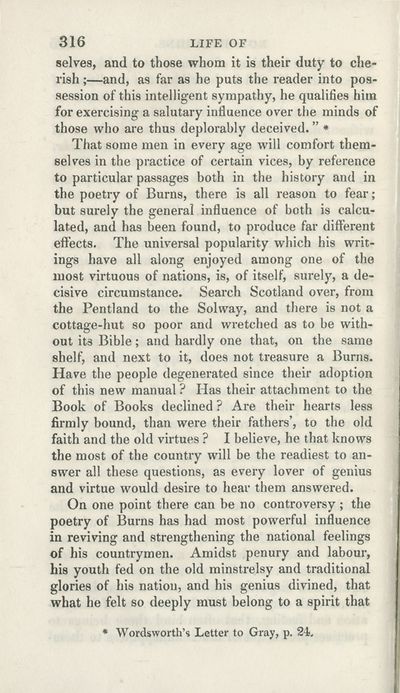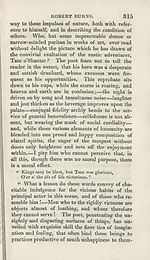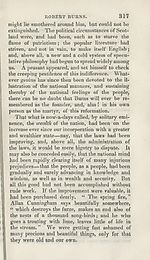Scotland/Scots > Life of Robert Burns
(326)
Download files
Complete book:
Individual page:
Thumbnail gallery: Grid view | List view

LIFE OF
316
selves, and to those whom it is their duty to che¬
rish ;—and, as far as he puts the reader into pos¬
session of this intelligent sympathy, he qualifies him
for exercising a salutary influence over the minds of
those who are thus deplorably deceived. ” *
That some men in every age will comfort them¬
selves in the practice of certain vices, by reference
to particular passages both in the history and in
the poetry of Burns, there is all reason to fear;
but surely the general influence of both is calcu¬
lated, and has been found, to produce far different
effects. The universal popularity which his writ¬
ings have all along enjoyed among one of the
most virtuous of nations, is, of itself, surely, a de¬
cisive circumstance. Search Scotland over, from
the Pentland to the Solway, and there is not a
cottage-hut so poor and wretched as to be with¬
out its Bible; and hardly one that, on the same
shelf, and next to it, does not treasure a Burns.
Have the people degenerated since their adoption
of this new manual ? Has their attachment to the
Book of Books declined ? Are their hearts less
firmly bound, than were their fathers’, to the old
faith and the old virtues ? I believe, he that knows
the most of the country will be the readiest to an¬
swer all these questions, as every lover of genius
and virtue would desire to hear them answered.
On one point there can be no controversy ; the
poetry of Burns has had most powerful influence
in reviving and strengthening the national feelings
of his countrymen. Amidst penury and labour,
his youth fed on the old minstrelsy and traditional
glories of his nation, and his genius divined, that
what he felt so deeply must belong to a spirit that
Wordsworth’s Letter to Gray, p. 2-t.
316
selves, and to those whom it is their duty to che¬
rish ;—and, as far as he puts the reader into pos¬
session of this intelligent sympathy, he qualifies him
for exercising a salutary influence over the minds of
those who are thus deplorably deceived. ” *
That some men in every age will comfort them¬
selves in the practice of certain vices, by reference
to particular passages both in the history and in
the poetry of Burns, there is all reason to fear;
but surely the general influence of both is calcu¬
lated, and has been found, to produce far different
effects. The universal popularity which his writ¬
ings have all along enjoyed among one of the
most virtuous of nations, is, of itself, surely, a de¬
cisive circumstance. Search Scotland over, from
the Pentland to the Solway, and there is not a
cottage-hut so poor and wretched as to be with¬
out its Bible; and hardly one that, on the same
shelf, and next to it, does not treasure a Burns.
Have the people degenerated since their adoption
of this new manual ? Has their attachment to the
Book of Books declined ? Are their hearts less
firmly bound, than were their fathers’, to the old
faith and the old virtues ? I believe, he that knows
the most of the country will be the readiest to an¬
swer all these questions, as every lover of genius
and virtue would desire to hear them answered.
On one point there can be no controversy ; the
poetry of Burns has had most powerful influence
in reviving and strengthening the national feelings
of his countrymen. Amidst penury and labour,
his youth fed on the old minstrelsy and traditional
glories of his nation, and his genius divined, that
what he felt so deeply must belong to a spirit that
Wordsworth’s Letter to Gray, p. 2-t.
Set display mode to:
![]() Universal Viewer |
Universal Viewer | ![]() Mirador |
Large image | Transcription
Mirador |
Large image | Transcription
| Antiquarian books of Scotland > Scotland/Scots > Life of Robert Burns > (326) |
|---|
| Permanent URL | https://digital.nls.uk/108249771 |
|---|
| Description | Thousands of printed books from the Antiquarian Books of Scotland collection which dates from 1641 to the 1980s. The collection consists of 14,800 books which were published in Scotland or have a Scottish connection, e.g. through the author, printer or owner. Subjects covered include sport, education, diseases, adventure, occupations, Jacobites, politics and religion. Among the 29 languages represented are English, Gaelic, Italian, French, Russian and Swedish. |
|---|

